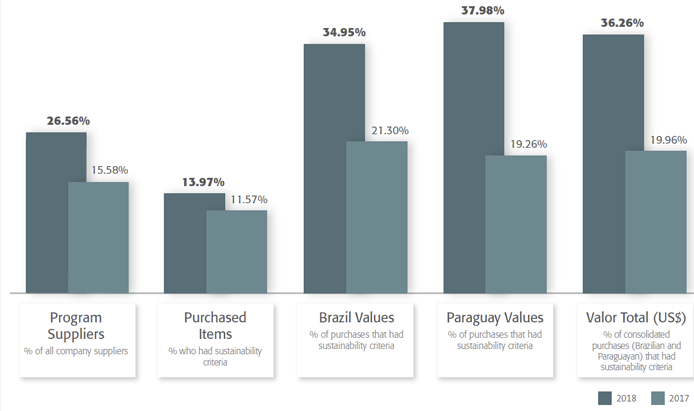[102-9, 102-42, 103-2, 103-3, 204-1, 205-2, 414-1]
All contracts undertaken by Itaipu comply with the criteria and modalities defined by its general bidding standard, which determines the selection of the most advantageous proposals for the entity, considering price, quality and the impacts for sustainability. The total number of suppliers registered in 2018 was 3,001, divided into 2,360 Brazilian companies and 641 Paraguayan companies.
In the year 2018, a total expenditure of US $199.2 million was recorded, of which 71.3% correspond to the hiring of local suppliers (from Paraguay and the state of Paraná). In 2017, the data were respectively US $131.2 million and 80.88%. The reduction in the percentage of expenditures with local suppliers is due to the increase in the value of total expenditures. For the same reason, the percentage of contracted local companies recorded a drop from 65.73% to 47%. [204-1]
In 2018, 193 were micro and small enterprises (MPEs) representing 20.36% of the companies contracted in Brazil. In order to increase their participation in their bids, Itaipu approved in 2018 procedures that could give preference to MPEs in hiring.
The main hires are represented, among others, by the materials and services of batteries, glue-ta of waste, fuels, computers, air conditioners, lubricating oil, lamps, tires, paper, industrial paints, surveillance, among other. In Brazil, it is estimated that 1,256 are service providers, 347 trades and 235 are industries. [102-9]
The mapping of suppliers that offer risks to sustainability has not changed and 434 companies continue to be considered critical, being 199 MPEs. Of the 100 groups evaluated, 50 were supplying goods and other services.
With the implementation of the binational program of integrity and compliance are planned steps that will deal exclusively with aspects related to suppliers (read more in the chapter our governance). [205-2]
Data from the Sustainable Procurement Program
[203-2, 204-1, 308-1, 414-1, 414-2]Supplier Engagement
[102-42]In 2018, after going through a process of re-structuring, the supplier evaluation system completed its first cycle of data collection, including sustainability requirements. This information will be used to define new policies and strategies for the purchasing area.
Another relevant action was the review of the Supplier Development Program (DESFOR), which resulted in the partnership with the Brazilian Support service for Micro and small Enterprises (Sebrae). 360 companies from the regions of Foz do Iguaçu, Curitiba, Pato Branco, Londrina, Maringá and Ponta Grossa will be trained in areas of competitiveness, productivity, sustainability and innovation, assisting in the implementation by the suppliers of the Excellence model Management (MEG®), a program certified by the National Quality Foundation.
Labor Practices and Human Rights in the Supply Chain
[103-2, 103-3, 407-1, 408-1, 409-1, 414-1]All suppliers must contractually guarantee compliance with the current labor legislation and the company’s code of conduct for suppliers, which condemns child labor practices and analogous to slave labor, among other aspects related human rights.
Companies that violate these requirements can be punished with the suspension of the legal instrument, as well as other appropriate measures. Itaipu does not hire suppliers that are included in the National Register of Unreputable and Suspended Companies of the Comptroller General of the Union.


 Português
Português Español
Español